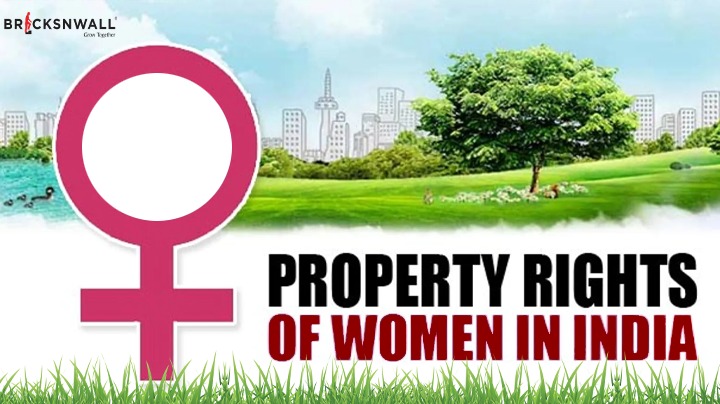Women's Property Rights | Property Rights for Women in India
Bricksnwall Trusted Experts

Hindu Property
Rights of Women in India and Maintenance
Daughters
Daughters have the same right to inherit their
father's property as sons have.
Daughters also have a piece of their mother's
property.
The Hindu Succession (Amendment) Act, 2005 (39 of
2005) took effect on September 9, 2005. The Amendment Act removes gender
discriminatory clauses in the Hindu Succession Act, of 1956 and grants the following
rights to daughters:
- The daughter of a coparcener shall, from birth, acquire the same rights and obligations in the coparcenary property as her son; she is assigned the same share as a son; she is subject to the same liability in the said coparcenary property; and she has the same rights and obligations in the coparcenary property as her son.
- A married daughter does not have the right to live with her parents, pay support, or have her debts transferred to her spouse. Nonetheless, in the event that a married daughter is abandoned, divorced, or widowed, she is entitled to live there.
- As long as she has reached the majority, a woman enjoys complete ownership rights over any property that she has earned, received as a gift, or is the subject of a will. She may get rid of these whatever she pleases—by gift, sale, or other means.
Spouses
A married woman is the only one with ownership
rights to her own belongings. Unless she gives it all or a portion of it to someone.
Whether they are acquired via hard work, inheritance, or gifting, she is the
only manager and owner of them.
entitled to spousal maintenance, support, and
housing, or from the family if her husband is a joint family member.
She is entitled to a share that is equal to
everyone else's upon the division of a joint family inheritance between her
husband and his sons. In a same vein, she and her children as well as his
mother are entitled to an equal amount of the husband's property after his
death.
Mothers
Children who are not dependents are entitled to
support. She is a Class I heir as well.
If the sons divide the joint family estate, the
widowed mother is entitled to a portion equal to each son's share.
She may dispose of any of her possessions any way
she sees fit, whether by a will, sale, or gift.
Regardless of gender, her children will share equally in the event of her intestate death.
Muslim Law Property Rights of Women in India and Maintenance
Daughters
In inheritance, the daughter's part is equivalent
to one-half of the son's, in accordance with the principle that a woman is
worth half a man.
She has, and has always had, complete power over
this land. It is legally hers to manage, control, and dispose of as she sees
fit, both during her lifetime and beyond.
Though she may receive gifts from those from whom
she would inherit, there should be no mistake that the gift is a means of
bypassing the inheritance regulations of one-third of a man's portion, as per
Muslim law. Inheritance shares are extremely stringent.
Daughters have the right to live with their parents
and get support until they marry.
In the event of divorce, the fee for support is returned to her paternal family after the iddat time (about three months). In case she has children who can assist her. The charge is imposed on them.
Wives
In Islamic law, a woman's identity, though lower in
status than a man's, is not extinguished in him when she marries.
She thereby maintains control over her assets and
properties. She is entitled to the same maintenance as his other wives and may
take legal action if he discriminates against her.
The Supreme Court ruled that in the event of a
divorce, a Muslim husband is required to make reasonable and fair provisions
for the divorced wife's future, which certainly includes her maintenance.
According to Section 3 (1Ha) of the Muslim Women
(Protection of Rights on Divorce) Act, 1986, a reasonable and fair provision
extending beyond the iddat time must be made by the husband within the iddat
period. It is not the responsibility of the Muslim husband to provide
maintenance during the iddat period.
The right to "more" is granted in
accordance with the stipulations of the marriage contract.
She will inherit one-eighth of his estate if he has children and one-fourth if he does not. If there is more than one woman, the portion may be reduced to one-sixteenth. In cases where there are no sharers in the estate as required by law, the wife may inherit a larger sum through a will. A Muslim may leave one-third of his possessions in a will, but not to a sharer in the inheritance.
Mothers
If she gets divorced or becomes a widow, her
children have the right to provide support.
The laws of Muslim law will determine how her
property is distributed.
One-sixth of her deceased child's estate is hers to inherit.
Maintenance
The Criminal Procedure Code's Section 125 specifies maintenance obligations for parents, spouses, and children.
- If someone with enough money ignores or declines to provide for—His wife, who is unable to provide for herself—or
- His parent(s), whether biological or adopted, who is incapable of providing for themselves
- In some situations, the court may mandate that the individual provide a monthly maintenance payment to the spouse, child, or parents.
- A monthly amount for interim maintenance may also be granted by a first-class magistrate's order while the current order is pending
- The application for the monthly allowance for interim maintenance and proceeding expenses must, to the greatest extent feasible, be resolved within sixty days after the applicant's notice being served.
- "Wife" refers to a woman who has not remarried after being divorced either by her husband or through another divorce attorney.
Significant Judiciary Declarations Property Rights of Women in India and Maintenance.
Mangatmul V. Punni Devi (1995) (5) scale 199 SC
Maintenance must invariably include a
dwelling clause. Maintenance is provided so that the woman can live in a way
that she is essentially used to. As a result, the idea of maintenance must
consider the fundamental requirement for a roof over one's head as well as the
provision of food, clothing, and other necessities.
Sh. Rajesh Chaudhary vs. Nirmala Chaudhary, CM(M) 1385/2004The DeIhi High Court
DeIhi High Court –In this case, the individual
sought permission to determine the paternity of the female kid. He intended to
use DNA testing to determine the paternity of the child, who was supposedly not
his. The question of whether an estranged wife claiming support for herself and
her kid can be refused interim maintenance while the complex matter of DNA testing
on an allegation of illegitimacy of the child is being resolved.
Held that Blood-grouping tests are important for
determining contested paternity. Courts can use it as circumstantial evidence
to rule out a certain individual as the child's father. However, no one can be
forced to give a blood sample for analysis against his or her choice, and there
can be no negative consequences for refusing. Blood tests are not often used in
Indian courts. Wherever such prayers are requested in order to obtain a proving
inquiry, the prayer for a blood test cannot be granted.
The law assumes that a marriage ceremony is lawful
and that each individual is legitimate. Marriage or filiation (parentage) can
be presumed; the law generally presumes against vice and immorality. The court
must carefully consider the consequences of ordering the blood test, whether it
will have the effect of branding a child as a bastard and the mother as an
unchaste woman." When it comes to the sustenance of a minor child and her
mother, the petitioner's wife, it cannot wait for the alleged illegitimacy to
be determined and should be ordered as soon as possible if found payable.
Smt. B.P. Achala Anand, Civil Appeal No. 4250 of 2000
In this decision, the Supreme Court observed that a wife has the right to live in the marriage house under personal laws. A wife is entitled to be supported by her husband. She is entitled to be under his shelter and protection. She is also entitled to separate residence if she is forced to live apart from her husband due to his conduct, reluctance to keep her in his own home, or other just cause. The right to residence is part and parcel of the wife's entitlement to maintenance. For the purposes of maintenance, the term "wife" includes a divorced wife.
Bharat Heavy Plates and Vessies Ltd., (AIR 1985 Andhra Pradesh 207)
The husband worked in a company. He was assigned a
company quarter where he lived with his wife. The quarter was the matrimonial
residence. However, conflicts arose between the husband and wife, resulting in
their estrangement, and the wife eventually moved to court, charging her
husband with failing to support her and her three small children. The husband
had departed the company quarter, which was now only occupied by his wife and
minor children. The spouse also wrote to the company to terminate the lease,
which was in his benefit.
The woman went to court for protection, seeking an
injunction to stop the corporation from evicting her and her three minor
children. The High Court affirmed the judgement before it, which prevented the
company from evicting the wife and her minor children. The Court considered the
facts that the quarter was intended to be utilised by the employee and that the
husband was obligated to provide housing for the wife and children. The husband
and the company both recognised the quarter as the matrimonial home, where the
wife also resided. The sum of rent was to be deducted from the husband's pay.
- As long as she is of legal age, a woman has total ownership of any property she has earned, been granted, or willed to her. She is allowed to dispose of these in any way she sees fit, including sale, gift, and will.
- A wife has no right to her husband's Ancestral Property, but she can receive a share if he dies without a will.
- In 2005, the Hindu Succession Act was changed to provide women equal rights. According to the the modification, daughters get equal rights as coparceners.
- Yes, married women in India have same rights to their father's self-acquired property as unmarried daughters.




